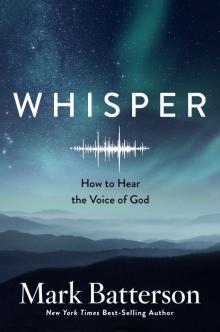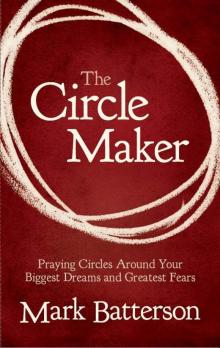- Home
- Mark Batterson
Whisper Page 8
Whisper Read online
Page 8
Dick started weeping in that hospital room as the Lord impressed upon him a simple yet profound truth: the spirit of man is deeper than the cortex of the brain. And even when the cortex of the brain is damaged, the Spirit of God can still commune with us. Perhaps that’s what the writer of Hebrews was saying: “Sharper than any double-edged sword, it penetrates even to dividing soul and spirit, joints and marrow.”23
Nearly two decades later Dick was telling that story during a chapel service at Gordon-Conwell Theological Seminary. At the end of the service, a young seminarian came running up to him. He said, “I’m an intern at a local church, and this past week I was sent to a nursing home to see a Mrs. Fredericks.” Mrs. Fredericks was well into her nineties, suffering from severe dementia. She would lie in her bed, facing the wall for hours on end and babbling nonsense syllables.
That’s how the seminarian found her when he went to visit her. No amount of conversation seemed to break into her consciousness, so the seminarian told her that he was going to leave after praying. That’s when Mrs. Fredericks rolled over and said, “Young man, before you go, I want to say something.” She began to quote Psalm 119, the longest psalm in the Bible. He quickly turned to the psalm in his Bible to follow along. Mrs. Fredericks quoted all 176 verses, word for word. Then she rolled over and began babbling again.
I don’t fully understand why Denny suffered a heart attack in his twenties or why Mrs. Fredericks suffered dementia in her nineties, and we won’t sidestep the language of pain. It’s a difficult language to discern, but it’s a language Jesus knew by broken heart. We’ll double back to pain, but let me zero in on this: although we may never get to the bottom of the Bible, the Bible does get to the bottom of us. It penetrates the soul and spirit; it divides joints and marrow. And like a spiritual sonogram, it reveals the thoughts and attitudes of the heart.
The Word of God is longer than the longest memory and stronger than the strongest imagination. It’s also deeper than the cortex of the brain. But we must do what the psalmist himself did: “Thy word have I hid in mine heart, that I might not sin against thee.”24
Reframe
In The Voyage of the Dawn Treader,25 there is a fantastic scene where a painting of a ship on the high seas literally comes to life. A very irksome boy named Eustace Scrubb is badgering his cousins Lucy and Edmund for their silly belief in a place called Narnia when the water from the painting starts flooding the room.
Instead of entering Narnia through a wardrobe, as they had done before, the children enter through the picture frame. It is their portal to a very different reality, a world called Narnia and a lion named Aslan. The picture frame reframes what is possible. The picture frame reframes who they are—boys and girls who become kings and queens.
The Bible is our picture frame. It redefines possibility: “I can do all things through Christ who strengthens me.”26 It reframes reality: “No eye has seen, no ear has heard, and no mind has imagined what God has prepared for those who love him. But it was to us that God revealed these things by his Spirit.”27 And it reminds us of who we really are: “as many as received Him, to them He gave the right to become children of God.”28
I’m afraid that for some the Bible is like a painting that hangs on the wall. We occasionally give it a glance, but it’s nothing more than a pretty picture to look at. It’s as static as the status quo. Why? Because all we do is read it. We don’t do it. The Bible comes alive only when we actively obey it.
The Word of God is as powerful as the four words “Let there be light,”29 which are still creating galaxies! The Word of God is as powerful as one word, Ephphatha, which is opening deaf ears and asthmatic lungs! The prophet Isaiah said that His Word does not return void.30 The prophet Jeremiah said that God is watching over His Word to perform it.31 So let’s not just read it; let’s stand on it. Better yet, let’s live it out.
The surest way to get into the presence of God is to get into the Word of God. It changes the way we think, the way we feel, the way we live, and the way we love.
“If you abide in me, and my words abide in you, ask whatever you wish, and it will be done for you.”32 Whatever you wish? Yes, whatever you wish. But here’s the catch: if the Word of God truly abides in you, you won’t want anything beyond the boundaries of God’s good, pleasing, and perfect will. And I’ll detail that idea when we talk about the language of desires. Suffice it to say, the Word of God sanctifies our desires until the will of God is all we want.
God is not a genie in a bottle, and our wish is not His command. Quite the opposite. As we grow in grace, His command becomes our only wish.
The word abide is repeated nine times in the King James Version of the fifteenth chapter of John. It’s a present imperative verb, which indicates continual action. And it’s one of those biblical words that has seventy faces. It means to “be moved”; it’s one way the Spirit of God stirs our spirits. It means “to stand still”; it’s planting our feet on the promises of God and refusing to back down or back off. It means “to stay overnight.” When was the last time you pulled an all-nighter in prayer, in worship, in the Word? And it means “to dwell.” God not only wants to take up residence within us; He wants to spend all eternity with us.
Hearing the voice of God starts with quickening. If you want to hear the still small voice of God, abiding is key. And the final key to hearing is doing. Hearing without doing is hearsay at best and hypocrisy at worst. We can and must do better than that.
Lectio Divina
The mind produces a wide variety of brain waves, the most common being beta waves, which oscillate between fourteen and thirty cycles per second.33 Beta waves are associated with normal waking consciousness, including anxious thoughts and active concentration. If we slow our minds down, we enter a state of relaxed alertness that produces alpha waves between eight and thirteen cycles per second. Those alpha waves are amplified by closed eyes, which might be a physiological argument for praying and meditating that way.34
The pace at which we read Scripture is not insignificant. Honestly, I tend to speed-read when I get to verses that cause conviction or confusion. But that’s when I need to slow down and listen more carefully. Some truths are comprehended only via contemplation. You have to, quite literally, get on the right wavelength. When you feel like reading quickly, read slowly.
Reading the Bible for breadth is called lectio continua.
Reading the Bible for depth is called lectio divina.
Lectio divina is an ancient Benedictine practice, and it’s one way to discern the voice of God. It involves four steps, or stages: reading, meditating, praying, and contemplating. Lectio divina has been likened to a meal, and I like that metaphor.
Reading is taking the first bite. Unfortunately, that’s where most people stop. The second step, meditation, is chewing on words and phrases. Instead of dissecting the Word, we let the Word dissect us. The third step, prayer, is savoring the Word. When was the last time you read the Bible for pure enjoyment? It’s prayer that turns discipline into desire; “have to” becomes “get to.” And the fourth step, contemplation, is digesting the Word and absorbing its nutrients. That’s how the Word gets from our head into our heart.
I wish that hearing the voice of God was as easy as reading, but it’s not. It requires meditating, praying, and contemplating. Ironically, it’s only as we slow ourselves down that the Holy Spirit quickens us. But there is one more piece to the puzzle.
“Christianity has not so much been tried and found wanting,” said G. K. Chesterton, “as it has been found difficult and left untried.”35 You can’t just read the Word, meditate on it, pray through it, and contemplate it. You have to do it. Until you obey it, you’ve simply been educated beyond the level of your obedience.
“I wonder what would happen,” said Peter Marshall, “if we all agreed to read one of the Gospels, until we came to a place that told us to do something, then went out to do it, and o
nly after we had done it…began reading again?”36 I’ll tell you exactly what would happen: God’s kingdom would come and His will would be done! That’s what happens when hearers of the Word become doers of it.
Just do it.
Then see what God does!
THE VOICE OF GLADNESS
The Second Language: Desires
Take delight in the LORD, and he will give you the desires of your heart.
—PSALM 37:4
On New Year’s Day 2014, a British ballerina named Gillian Lynne was named Dame Commander of the Order of the British Empire. I had no idea what that means, but it sounded awfully impressive, so I looked it up. It’s one of the highest honors bestowed upon a civilian for a noncombatant contribution to the United Kingdom. Methinks ballet qualifies as noncombatant.
On her twentieth birthday, Gillian was cast as the soloist in the Royal Ballet’s Sleeping Beauty, and she never looked back. She parlayed dancing into a choreography career that produced the likes of Cats and The Phantom of the Opera. Gillian’s résumé as a dancer and choreographer is perhaps unparalleled, but like every other success story, it started out as nothing more than a single-cell desire.
When Gillian was a schoolgirl in the 1930s, teachers were concerned that she had a learning disorder because she couldn’t sit still. Her fidgetiness would probably be diagnosed as ADHD today, but that wasn’t a consideration back then. So she was taken to a specialist who listened as Gillian’s concerned mother recounted her eight-year-old’s issues. Twenty minutes into the conversation the doctor asked Gillian’s mother for a word in private. As they left the counseling room, he turned on the radio and told Mrs. Lynne to watch. Gillian immediately got up and started moving to the music. The discerning doctor said, “Mrs. Lynne, Gillian isn’t sick. She’s a dancer. Take her to dance school.”1 And that’s what Gillian’s mother did.
“I can’t tell you how wonderful it was,” said Gillian. “We walked in this room and it was full of people like me. People who couldn’t sit still. People who had to move to think.”2 It was almost as if Gillian were reborn. And although eight decades have come and gone, the desire to dance is still the driving force of her life.
After sharing Gillian’s story in the most watched TED Talk in history, “Do Schools Kill Creativity?,” education expert Sir Ken Robinson noted the brilliance of the specialist: “Somebody else might have put her on medication and told her to calm down.”3
Let me go on the record as saying that I’m eternally grateful for doctors and medicine. Both have saved my life multiple times. This isn’t an argument against a doctor’s prescription in any way. It’s simply an argument for pursuing God-ordained desires.
American psychologist Abraham Maslow may have said it best: “A musician must make music, a builder must build, an artist must paint, a poet must write, if he is to be ultimately at peace with himself.”4 And I’d say not just “at peace” but “at liberty.” What’s the point in trying to be who you aren’t? If you succeed, you is who you ain’t, and you ain’t who you is. You’re actually less like the person God designed you and destined you to be. That isn’t succeeding; it’s failing. And I, for one, would rather fail at something I love than succeed at something I don’t. And it starts with deciphering our desires, the second language of God.
Take delight in the LORD, and he will give you the desires of your heart.5
We tend to think of desires in a negative light, but C. S. Lewis had the opposite opinion. “We are half-hearted creatures, fooling about with drink and sex and ambition when infinite joy is offered us.”6 According to Lewis, “Our Lord finds our desires not too strong, but too weak.”7 Some desires are sinful, no doubt. And those sinful desires must be crucified. But God also wants to resurrect them, sanctify them, intensify them, and leverage them for His purposes.
Pure Delight
My niece Ella Schmidgall wanted a dog more than anything in the world. Perhaps more than any little girl ever! For five years she prayed and petitioned and pleaded with her parents for a dog. Ella is incredibly sweet, so how her parents held out as long as they did is a mystery to me. After waiting half her life for a dog, Ella got the surprise of a lifetime on her tenth birthday. Her mom told her to close her eyes as her dad handed her a 3.6-pound Maltipoo puppy named Reece. Ella started sobbing uncontrollably. I know this because her mom filmed it for the extended family. I don’t know if I’ve ever seen anyone more overcome with unspeakable joy!
Ella’s reaction is my definition of delight.
Seven times in the book of Genesis, God steps back from the canvas of His creation and admires His handiwork and sees that it is good.8 It’s the Almighty’s first reaction to His creation. It’s the first recorded emotion that God expresses. The word good comes from the Hebrew word tob.9 It’s joy unspeakable. It’s pure delight.
That first emotion sets the tone, sets the bar. God delights in what He does, and He wants nothing less for us. He wants us to delight in His creation. He wants us to delight in one another. And above all, He wants us to delight ourselves in Him.
The first tenet of the Westminster Shorter Catechism says “Man’s chief end is to glorify God, and to enjoy him forever.”10 We fully subscribe to the first half, but I’m not sure we fully appreciate the significance of the second half. How much do you enjoy God? Enjoy His Word? Enjoy His presence? Sure, spiritual disciplines usually start out as disciplines. But sooner or later those disciplines turn into desires if you delight yourself in the Lord.
Tell me how much you enjoy God, and I’ll tell you how spiritually mature you are. The last thing God wants is for His Word to feel like a chore. Do you read it for enjoyment? If not, you’re reading it wrong. Sometimes His Word convicts us of sin, which causes a twinge of guilt, but that’s the first step in seeking forgiveness and finding grace. And that always leads to greater joy. Obeying God is our greatest joy, our highest privilege! Loving God with all our strength certainly requires labor, but it should be a labor of love.
Seek First
When I was in seminary, there was a distinct moment when I felt called to write. I was praying in the chapel when the still small voice whispered, Mark, I’ve called you to be a voice to your generation. The irony is that I had just taken a graduate assessment that showed a low aptitude for writing.
Writing is not a natural gifting, but God compensated for that by giving me a strong desire to write. And trust me, it takes a ton of desire to meet deadlines. Sometimes your desires will line up with your talents, and that’s where you’re doubly dangerous to the Enemy! But God also calls us to do things that are outside our skill sets, requiring tremendous dependence upon His help.
At first my desire to write expressed itself as a voracious appetite to read. As I already mentioned, I read very few books before my senior year of college. But once I felt called to write, I knew I needed to read. And I spent every spare minute and every spare dollar doing it. I read three thousand books before I wrote one.
I have no doubt that God conceived that desire within me. And I write for one reason: I’m called to write. When I sit down at my computer, I take off my shoes because I’m on holy ground. And I don’t just type with the keyboard; I worship God with the twenty-six letters of the English alphabet. I’ve written fifteen books over the past decade, and each one is an echo of that one whisper.
In the Sermon on the Mount, Jesus revealed a supernatural sequence that is inviolable. He said, “Seek first his kingdom and his righteousness, and all these things will be given to you as well.”11 I’m afraid many of us read this backward. We want everything the world has to offer, and then we’ll seek God. But that isn’t the way it works. You can’t seek God second or third or tenth and expect Him to give you the desires of your heart.
Seeking God first is delighting yourself in the Lord.
Seeking God first is giving Him the first word and the last word.
Seeking
God first is making sure His voice is the loudest voice in your life.
In the apostle Paul’s words, “I consider everything a loss because of the surpassing worth of knowing Christ Jesus my Lord.”12 Then and only then will God speak to us in the language of desires. He’ll change our desires, intensify our desires, and upload new desires within us. Those desires actually become spiritual compasses by which we navigate the will of God.
The Voice of Gladness
On the morning of July 11, 1924, Eric Liddell was preparing to run the four-hundred-meter race at the Paris Olympics. Liddell had withdrawn from the hundred-meter competition, a race he was favored to win, because he refused to run on a Sunday. As he prepared for the four-hundred-meter race, which was not his strongest event, he was handed a slip of paper with a paraphrase of 1 Samuel 2:30: “Those who honour me I will honour.” Despite drawing the outside lane, the “Flying Scotsman” broke the Olympic and world records with a time of 47.6 seconds and won the gold medal.13
In the 1981 Oscar-winning film Chariots of Fire, Eric’s sister doesn’t understand his devotion to the track and tries to convince him to give up running and move to China. He eventually went and served there as a missionary for eighteen years.14 But he also believed that God was the One who gave him the desire to run. “[God] made me fast,” explained Eric. “And when I run I feel His pleasure.”15
Hold that thought.
A few centuries ago there was a litmus test within the church to determine whether or not something was sinful: “Did you take pleasure in it?” If you did, it was a sin. What a terrible test. God Himself would fail that test in the first chapter of Genesis. The psalmist went so far as to say, “At your right hand are pleasures forevermore.”16 That doesn’t sound like a cosmic killjoy! That sounds more like Christian hedonism.17 In John Piper’s words, “God is most glorified in us when we are most satisfied in Him.”18

 Jack Staples and the Ring of Time
Jack Staples and the Ring of Time Jack Staples and the City of Shadows
Jack Staples and the City of Shadows Jack Staples and the Poet's Storm
Jack Staples and the Poet's Storm Whisper
Whisper The Circle Maker_Praying Circles Around Your Biggest Dreams and Greatest Fears
The Circle Maker_Praying Circles Around Your Biggest Dreams and Greatest Fears